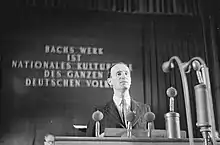Ernst Hermann Meyer
Ernst Hermann Ludimar Meyer (8 December 1905 – 8 October 1988) was a German composer and musicologist.

His works include numerous songs, as well as chamber music, two symphonies and other works for orchestra, an opera, and an oratorio. He wrote numerous musicological articles as well as a book on English chamber music. His pupils included Serge Hovey. As a musicologist, he edited numerous manuscripts by English composers of the Tudor and Renaissance periods (for example, Englische Fantasien aus dem 17. Jahrhundert : für drei Streichinstrumente = English fantasias from the 17th century : for three string instruments OCLC 2757300).
Life
Meyer was born in Berlin. He received his first piano lessons at the age of six, and started composing at eleven. After finishing school, he worked as an apprentice at a bank, and in 1926 he started the advanced study for music at Heidelberg University, where in 1930 he completed his Ph.D. on the 17th century chamber music of North German composers. He became a pupil of Hanns Eisler. Being a Jew, he emigrated to the United Kingdom in 1933 to avoid detention by the Nazi Party; there he eventually became a close friend of leftist composer Alan Bush. In the UK, he researched English chamber music of the 17th century and lectured for the Workers Educational Association. In 1939 he began lecturing at Bedford College, London; in 1945 he was given a guest professorship at King's College, Cambridge.
Meyer returned to East Germany (GDR) in 1948 and became one of the most influential figures of music culture there. He was active politically as a communist, and his works include choral, orchestral, and chamber music written to display commitment to Marxist–Leninist ideals. In 1982 the second edition of his book Early English Chamber Music was published.
Meyer was head of the German Society of Composers and Musicologists, professor of musicology at Berlin's Humboldt University, chairman of the German Handel Society, and founder of the annual Handel Festival, which is still celebrated in Halle, Germany.
Works
Selected Compositions
Among more than 300 songs, orchestral works, and other works:
- Symphony for Strings (1947)
- Mansfeld Oratorio (1950)
- String Quartet in G, Nr. 1 (1956)
- String Quartet Nr. 2 (1959)
- Poem, for Viola and Orchestra (1961)
- Concerto for Violin and Orchestra (1964)
- Symphony in B♭ (1967)
- String Quartet Nr. 3 (1967)
- Concerto for Harp and Chamber Orchestra (1968)
- Leinefelder Divertimento (1969)
- Toccata for Orchestra (1971)
- Reiter der Nacht, opera (1972)
- Concerto for Viola and Orchestra (1978)
- Sonata for Viola and Piano (1979)
- Essay for Viola Solo (1983)
Further reading
- Gur, Golan. 2015. "Classicism as Anti-Fascist Heritage: Realism and Myth in Ernst Hermann Meyer’s Mansfelder Oratorium (1950)." In: Kyle Frackman and Larson Powell (ed.), Classical Music in the German Democratic Republic: Production and Reception. Rochester: Camden House, pp. 34–57